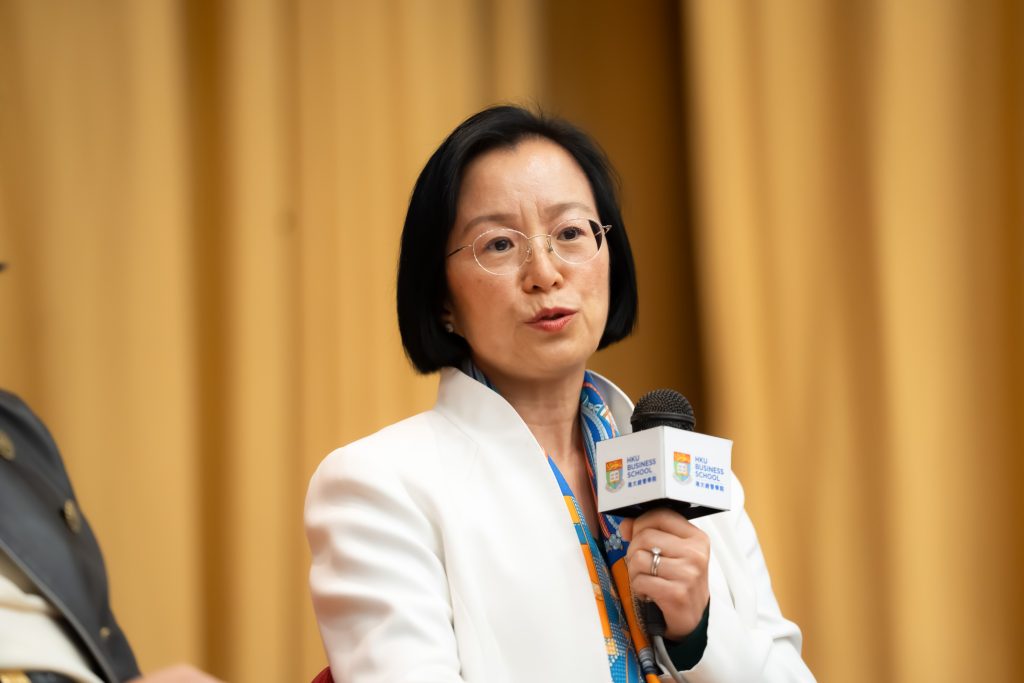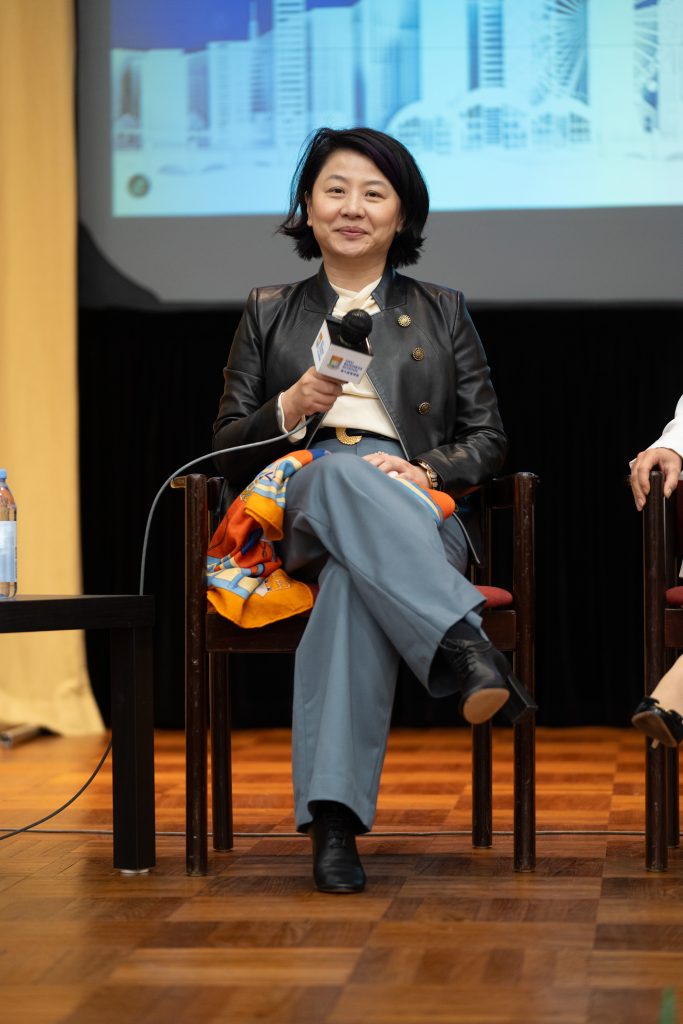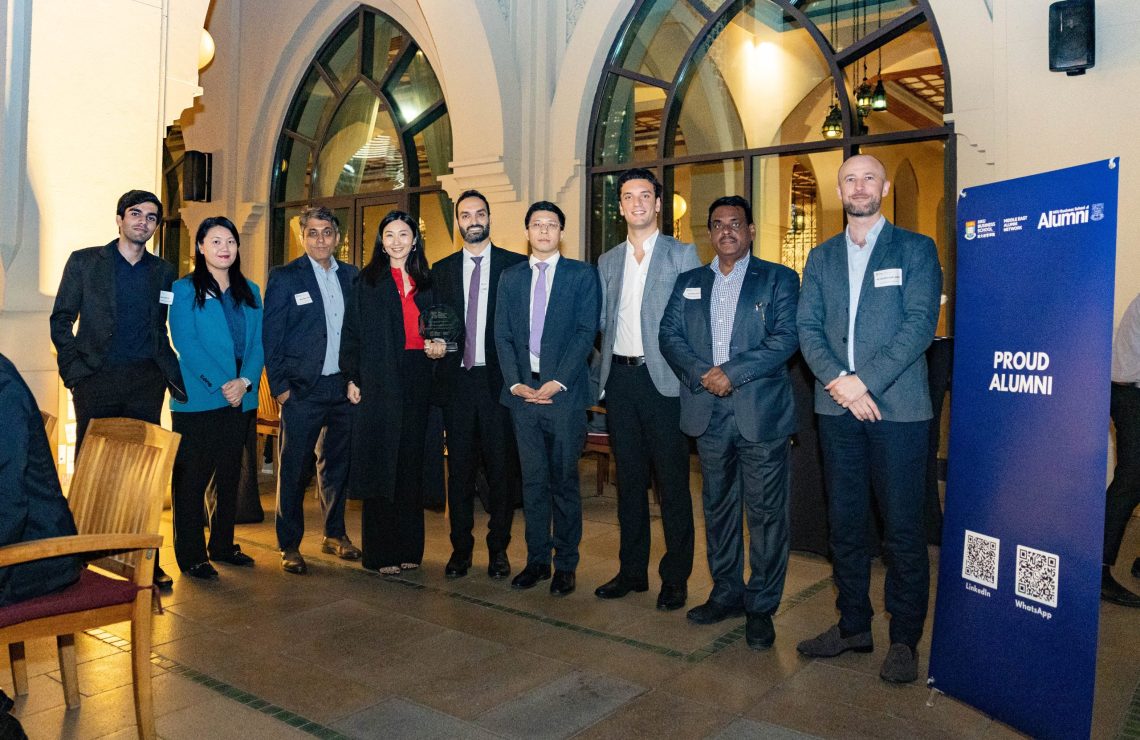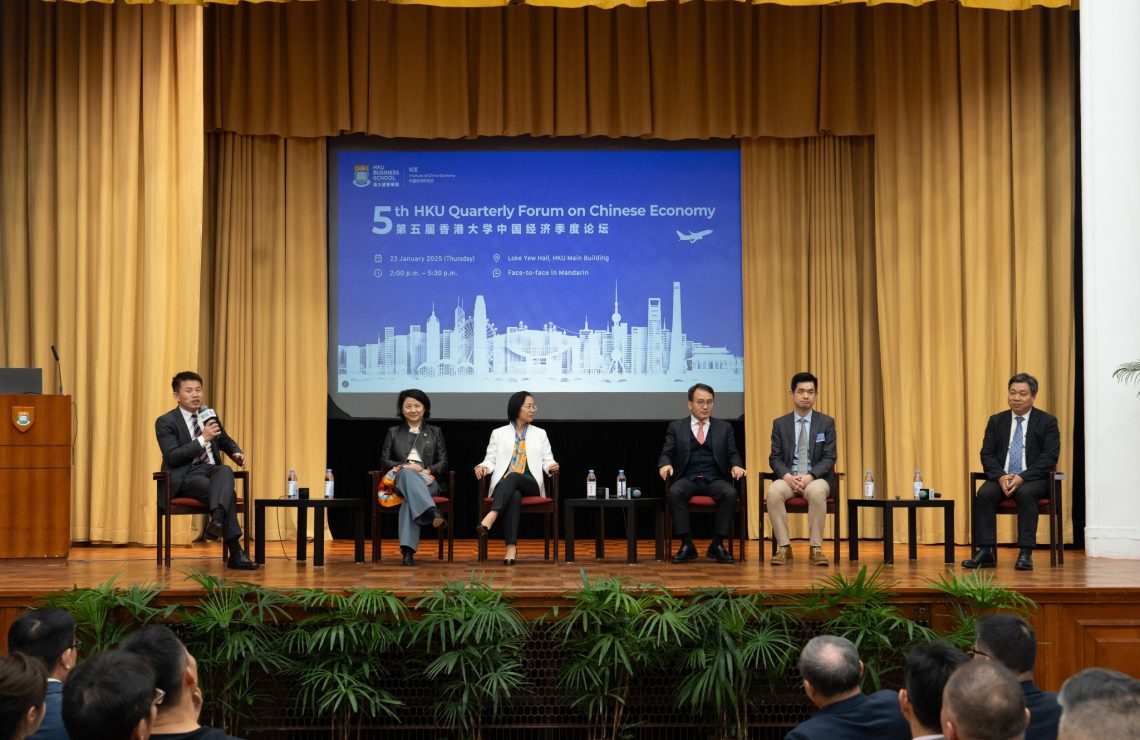
The 5th HKU Quarterly Forum on Chinese Economy Explores Challenges and Opportunities in China’s Macroeconomy
The 5th HKU Quarterly Forum on Chinese Economy, hosted by HKU Business School’s Institute of China Economy (ICE), in collaboration with the Peking University Alumni Association (Hong Kong), concluded successfully on 23 January. The Forum gathered prominent economists and industry leaders to examine the implications of China’s policy directions to the global economy and the current hot issues in the Chinese economy. Through keynote speeches and roundtable discussion, speakers shared valuable insights on the challenges and opportunities facing China’s macroeconomy, finance and international trade amidst the evolving global landscape. Held at HKU Loke Yew Hall, the Forum brought together a diverse audience of industry leaders, academic experts, alumni and students, with nearly 350 people in attendance.
Professor Hongbin CAI, Dean and Chair of Economics, Director of ICE of HKU Business School, said in his welcoming remarks, “China’s economic development has always been in the spotlight on the global stage, particularly amid the current shifts in international politics, which present various challenges and development opportunities. As an international platform that brings together great minds and insights from around the world to address critical challenges facing China, HKU Business School’s Institute of China Economy is hosting this forum to facilitate in-depth discussions from diverse perspectives, which will be beneficial to our understanding of the Chinese economy and policies. Globally, we actively connect with various emerging markets to expand the School’s international presence and collaboration network, aiming to bring greater impact to the industry and society.”
Professor Zhenhua MAO, Professor of Practice of HKU Business School and Member of Chief Executive’s Policy Unit Expert Group, presented the theme report titled “Demand as the Sail, Reform as the Rudder: China’s Economic and Policy Outlook in 2025”. He reviewed how China’s economy managed to achieve the expected growth target of 5% in 2024, amidst increasing external pressures and internal difficulties. This success is largely attributed to a shift in policy adjustments since the third quarter. Following a basket of incremental measures introduced by the central government at the end of September, various macroeconomic indicators, including consumption, investment, and production, showed marginal improvements in the fourth quarter. In this context, the central government emphasized the implementation of more proactive fiscal policies and moderately loose monetary policies, and stepped up efforts in unconventional counter-cyclical adjustments, which reflected it had a clear and comprehensive understanding of the difficulties and challenges facing the current economic situation. Professor Mao stressed that the Chinese economy is currently grappling with intertwined short-term and long-term issues, with certain institutional problems escalating into urgent issues. If these issues are not addressed simultaneously, they will constrain the effectiveness of macro-tightening measures. Looking ahead, it is essential to adhere to the principle of “demand as the sail, reform as the rudder”. By addressing medium- and long-term problems through reforms and deepening market system reforms to achieve more clarified roles of the government and market, the effectiveness of short-term policy measures centered on expanding demand can be better ensured. Professor Mao further pointed out that under the continuous policy adjustments, China’s economic growth is expected to reach 4.8% in 2025.
The Forum was followed by inspiring keynote speeches by three distinguished speakers. Dr. Haizhou HUANG, External Member of Monetary Policy Committee of The People’s Bank of China, analysed economic trends on the topic of “Global Economic and Market Outlook”. He pointed out that the new U.S. government’s policy will focus on “deregulating, down-sizing government, lowering tax rates, and increasing tariffs”. While the Chinese economy in the last few years faced a few challenges, including stagnating spending and income growth, increasing deposits, but lowering credit demand, resulting in deleveraging. Dr. Haizhou HUANG said, “I remain optimistic about China’s economy in 2025. I believe that in addition to reforms, we need to focus more on opening up to the outside world and more internal reforms. Both must proceed in parallel to go further.”
Professor Zheng (Michael) SONG, Wei Lun Professor of Economics and Head of Department of Economics of the Chinese University of Hong Kong, Fellow of Econometric Society, spoke on the topic of “The Triple Dilemma of Government Investment” and highlighted three major challenges facing local government investment in China in recent years, including the failure of incentive mechanism, investment mismatch and crowding-out effects, and the counter-cyclicality of misallocation and crowding-out. Professor Zheng (Michael) SONG stated, “In light of the current challenges, we must deliberate on whether the policy tools we have relied upon in the past remain effective in the new era. Instead of ‘adding’ to the existing economic policies, we should consider ‘subtraction’ that is more meaningful and effective.”
Professor Heiwai TANG, Associate Dean (External Relations) of HKU Business School, Victor and William Fung Professor in Economics & Director of Asia Global Institute, focused on the theme of “Global Economic Outlook” and pointed out that the global economy will continue to de-globalize in the coming decade, and will further transition towards multilateralism and multipolarity. At the same time, against the backdrop of global supply chain restructuring, rising industrial policies and geopolitical trade tensions, Chinese enterprises are facing a lot of economic pressure and operational challenges in their overseas expansion. Professor Heiwai TANG added, “Recently, I have visited several Southeast Asian countries and during my discussions with various enterprises, I observed that Chinese companies might been overly aggressive in their overseas expansion, leading to numerous challenges. However, I believe the current global environment still offers significant opportunities for Chinese enterprises, and that in the next five to ten years, the flying geese paradigm of economic development will reappear, with China as the leading goose. Hong Kong, serving as a bridge between Chinese and Western culture and trade, can play an important role in helping Chinese enterprises to go overseas.”
A roundtable discussion titled “Challenges and Solutions to China’s Current Macroeconomic, Financial, and International Trade Issues”, moderated by Professor Hongbin Cai. Panellists include Dr. Yifan HU, Managing Director, Regional Chief Investment Officer and Head Macroeconomics APAC of UBS Global Wealth Management; Ms. Hong QIU, Managing Director, Chairman and CEO of LAZARD Greater China; Mr. Hongyuan WANG, Founder and Partner, Former Chairman and Lifetime Advisor of First Seafront Fund Management Co., Ltd; Mr. Ziqiang XING, Managing Director of Morgan Stanley and Chief Economist of China and Mr. Haibin ZHU, Managing Director of J.P. Morgan and Chief Economist of China. Speakers expected that the stimulus measures in boosting domestic demand will meet market expectations in the short term, while China’s economy will continue to face challenges and pressures from various uncertainties in 2025, with economic growth ranging from 4.8% to 5%. Speakers also emphasized the need for the government to deepen reforms across different dimensions, including facilitating the implementation of policies for private enterprises, resolving the debt risk of local governments, optimizing measures to support enterprises to go overseas, and addressing real estate issues.
Photo Caption

Professor Hongbin CAI, Dean and Chair of Economics, Director of Institute of China Economy (ICE) of HKU Business School, delivers the welcoming remarks.
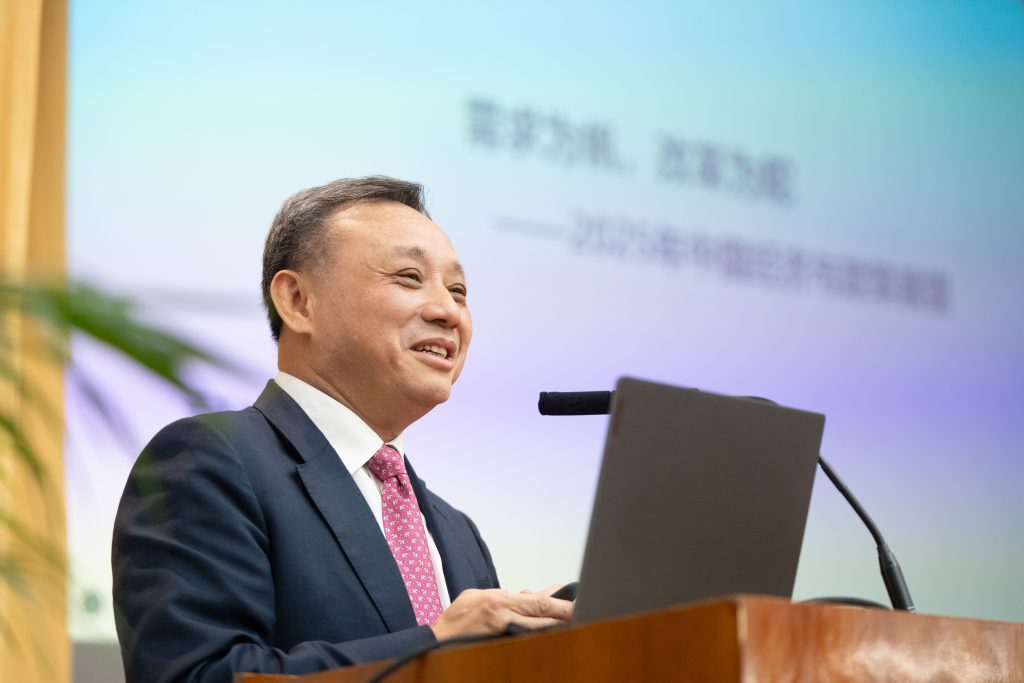
Professor Zhenhua MAO, Professor of Practice of HKU Business School and Member of Chief Executive’s Policy Unit Expert Group, presents the theme report.

Dr. Haizhou HUANG, External Member of Monetary Policy Committee of The People’s Bank of China, delivers a keynote speech.
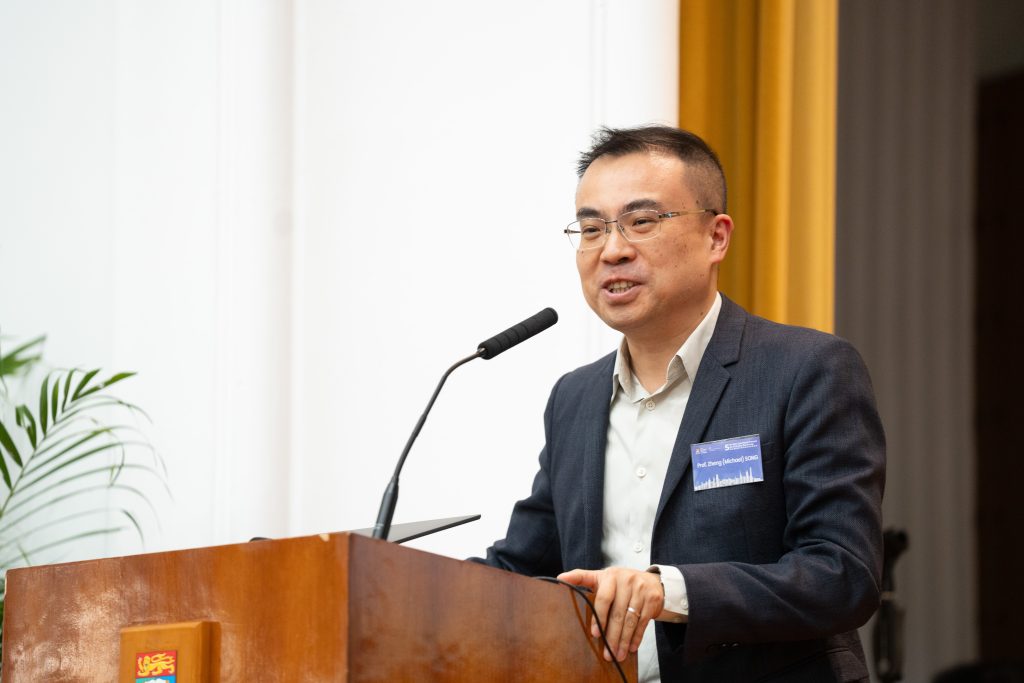
Professor Zheng (Michael) SONG, Wei Lun Professor of Economics and Head of Department of Economics of the Chinese University of Hong Kong, Fellow of Econometric Society, delivers a keynote speech.

Professor Heiwai TANG, Associate Dean (External Relations) of HKU Business School, Victor and William Fung Professor in Economics & Director of Asia Global Institute, delivers a keynote speech.

(From left) Professor Hongbin CAI, Dean and Chair of Economics, Director of ICE of HKU Business School; Yifan HU, Managing Director, Regional Chief Investment Officer and Head Macroeconomics APAC of UBS Global Wealth Management; Ms. Hong QIU, Managing Director, Chairman and CEO of LAZARD Greater China; Mr. Hongyuan WANG, Founder and Partner, Former Chairman and Lifetime Advisor of First Seafront Fund Management Co., Ltd; Mr. Ziqiang XING, Managing Director of Morgan Stanley and Chief Economist of China; Mr. Haibin ZHU, Managing Director of J.P. Morgan and Chief Economist of China, engage in a roundtable discussion.

Held at HKU, the Forum brought together a diverse audience of academic experts, industry leaders, alumni and students, with nearly 350 people in attendance.








